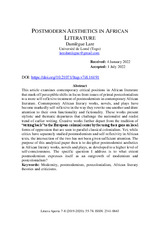Mostrar el registro sencillo del ítem
Postmodern Aesthetics in African Literature
| dc.contributor.author | Lare, Damlègue | |
| dc.date.accessioned | 2023-07-21T08:33:01Z | |
| dc.date.available | 2023-07-21T08:33:01Z | |
| dc.date.issued | 2019 | |
| dc.identifier.issn | 2341-0663 | |
| dc.identifier.uri | http://hdl.handle.net/10396/25806 | |
| dc.description.abstract | This article examines contemporary critical positions in African literature that mark off perceptible shifts in focus from issues of primal postcolonialism to a more self-reflexive treatment of postmodernism in contemporary African literature. Contemporary African literary works, novels, and plays have become markedly self-reflexive in the way they rewrite one another and draw attention to their own functionality and fictionality. These works present stylistic and thematic departures that challenge the nationalist and realist trend of earlier writing. Creative works further depart from the tradition of “writing back” to the European colonial center by focusing their gaze on local forms of oppression that are seen to parallel classical colonialism. Yet, while critics have separately studied postmodernism and self-reflexivity in African texts, the intersection of the two has not been given sufficient attention. The purpose of this analytical paper then is to decipher postmodernist aesthetics in African literary works, novels and plays, as developed to a higher level of self-consciousness. The specific question I address is to what extent postmodernism expresses itself as an outgrowth of modernism and postcolonialism? | es_ES |
| dc.description.abstract | Este artículo examina las posiciones críticas contemporáneas en la literatura africana, que muestran cambios perceptibles de enfoque, de un poscolonialismo primario a un tratamiento más autorreflexivo del posmodernismo en la literatura africana contemporánea. Las obras literarias africanas contemporáneas (novelas y obras de teatro) se han vuelto visiblemente autorreflexivas, en la medida en que se reescriben entre sí y llaman la atención sobre su funcionalidad y ficcionalidad. Estas obras presentan una evolución estilística y temática que desafía la tendencia nacionalista y realista de los textos anteriores. Las obras estudiadas también representan una ruptura con la tradición de responder al centro colonial europeo al poner el foco en las formas locales de opresión, paralelas al colonialismo clásico. Sin embargo, aunque los críticos han estudiado por separado el posmodernismo y la autorreflexión en los textos africanos, la intersección entre los dos no ha recibido suficiente atención. El propósito de este artículo, pues, es estudiar el posmodernismo documentado en las obras literarias africanas, en la medida en que es desarrollado con un grado superior de autoconciencia. La pregunta específica que se intenta responder es hasta qué punto el posmodernismo en la literatura africana debe leerse como un desarrollo del modernismo y del poscolonialismo. | es_ES |
| dc.format.mimetype | application/pdf | es_ES |
| dc.language.iso | eng | es_ES |
| dc.publisher | Cultural Association Littera Aperta | es_ES |
| dc.rights | http://creativecommons.org/licenses/by/4.0/es/ | es_ES |
| dc.source | Littera Aperta 7-8, 85-92 (2019-2020) | es_ES |
| dc.subject | Modernity | es_ES |
| dc.subject | Postmodernism | es_ES |
| dc.subject | Postcolonialism | es_ES |
| dc.subject | African literary theories and criticisms | es_ES |
| dc.subject | Modernidad | es_ES |
| dc.subject | Posmodernismo | es_ES |
| dc.subject | Poscolonialismo | es_ES |
| dc.subject | Teorías y críticas literarias africanas | es_ES |
| dc.title | Postmodern Aesthetics in African Literature | es_ES |
| dc.title.alternative | Estética Posmoderna en la Literatura Africana | es_ES |
| dc.type | info:eu-repo/semantics/article | es_ES |
| dc.relation.publisherversion | https://www.uco.es/ucopress/ojs/index.php/litteraaperta/ | es_ES |
| dc.rights.accessRights | info:eu-repo/semantics/openAccess | es_ES |

